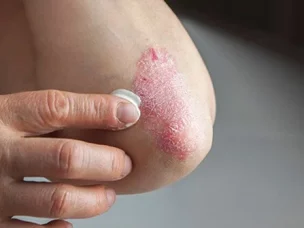Psoriatic Arthritis
Effectiveness and Safety of Risankizumab in Psoriatic Arthritis
Risankizumab exhibits significant efficacy and a favorable safety profile in treating psoriatic arthritis, according to a recent meta-analysis. Psoriatic arthritis (PsA) is an inflammatory joint disease affecting approximately 30% of psoriasis patients and 0.7% of the general population. Risankizumab, a humanized immunoglobulin G1 monoclonal antibody targeting the p19 subunit of interleukin-23, which plays a pivotal...
Prevalence of Headaches in Psoriatic Arthritis and Axial Spondyloarthritis Patients
An observational study found an increased prevalence of headaches and migraine in psoriatic arthritis and axial spondyloarthritis patients. Psoriatic arthritis (PsA) and axial spondyloarthritis (axSpA) are inflammatory diseases affecting the joints, with shared genetic backgrounds and clinical manifestations. Headache affects over 50% of adults worldwide, with migraine being the most prevalent. Studies indicate a correlation...
Psoriasis Linked to Higher Risk for Thyroid Disease
MONDAY, March 29, 2021 (HealthDay News) — Psoriasis is associated with an increased risk for thyroid disease among U.S. adults, according to research published online March 16 in the Journal of the American Academy of Dermatology. Jeffrey Liu, from the Keck School of Medicine at the University of Southern California in Los Angeles, and colleagues...
Racial Disparities in Psoriatic Arthritis Care
A retrospective Medicaid data analysis notes delays in initiating disease-modifying anti-rheumatic drug therapy in Black vs. White patients with psoriatic arthritis. Psoriasis is an autoimmune disorder with highly varying presentations. Although skin lesions are present in most cases of psoriasis, epidemiological data suggests that 30% of those affected by psoriasis will ultimately develop psoriatic arthritis...
Comorbidities Explored in Palmoplantar Pustulosis
Patients with palmoplantar pustulosis (PPP) have an overlapping comorbidity profile with patients with psoriasis vulgaris, according to a study published in JAMA Dermatology. Dong Hyo Kim, M.D., from the Seoul National University College of Medicine in South Korea, and colleagues conducted a nationwide population-based cross-sectional study involving Korean patients diagnosed with PPP, psoriasis vulgaris, or...
Psoriatic Arthritis and Gender Disparities
A recent study identified gender disparities in disease presentation in psoriatic arthritis patients, with women more likely to present with polyarthritis and men more likely to present with oligoarthritis. Men were also at greater risk of nail involvement and hyperuricemia. Psoriasis is a polymorphic disease with a varied clinical presentation. Though the disease typically starts...
Candidate Biomarkers Identified for Psoriasis Progression
Candidate biomarkers for disease progression in psoriasis have been identified, according to a review published in the British Journal of Dermatology. Ravi Ramessur, B.M.B.S., from King’s College London, and colleagues conducted a systematic review of relevant articles published between 1990 and December 2021 to identify and catalog candidate biomarkers of disease progression in psoriasis. Data...
Upadacitinib Beats Placebo for Psoriatic Arthritis
WEDNESDAY, March 31, 2021 (HealthDay News) — For patients with psoriatic arthritis, upadacitinib at a dose of 15 mg or 30 mg once daily is more effective than placebo, according to a study published in the April 1 issue of the New England Journal of Medicine. Iain B. McInnes, M.D., Ph.D., from the University of...
Cardiorespiratory Fitness Linked to Psoriasis, Psoriatic Arthritis
FRIDAY, Jan. 15, 2021 (HealthDay News) — Low cardiovascular fitness in late adolescence is associated with an increased risk for incident psoriasis and psoriatic arthritis among men, according to a study published online Jan. 11 in PLOS ONE. Marta Laskowski, from the University of Gothenburg in Sweden, and colleagues examined the association between cardiorespiratory fitness...
More Medical News













